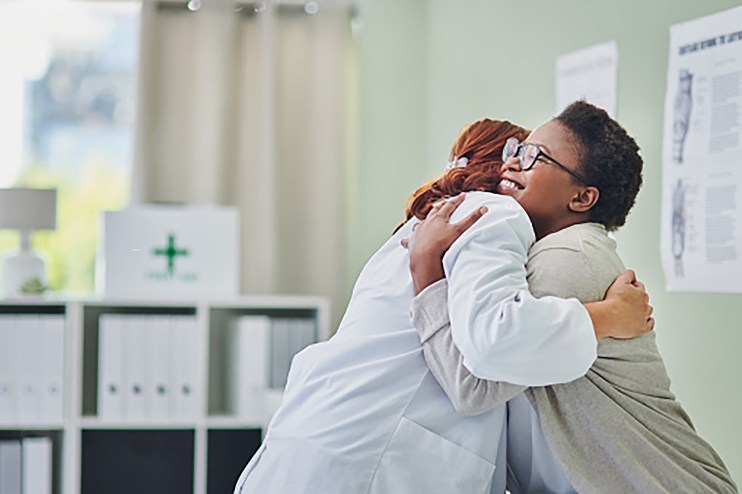Help Us, Help You: spotting cancer early saves lives

Cancer symptoms can be varied and not always obvious. Being able to identify them early, and speaking to your GP, is always the best action
The very mention of the C-word is enough to send a shudder through the spine of many people – but if you’re experiencing symptoms that are unusual for you, it’s important not to ignore them – it might save your life.
The NHS’s Help Us, Help You campaign is raising awareness of the many types of cancer that have nuanced symptoms. These may not be obvious and can feel relatively mild. The key is to know what to look out for and make sure you visit your GP practice if you’re in any doubt.
Blood cancers are the fifth most common type of cancer in the UK with over 41,000 people diagnosed every year.
NHS England’s National Clinical Director for Cancer, Professor Peter Johnson
Most times it will turn out to be nothing but it’s vital you make sure: the sooner you take action, the better your chances of making a full recovery. Either way, visiting your doctor will give you the peace of mind you need.
It comes down to body awareness: you are the best judge of what is ‘normal’ for you. Nobody knows your body like you do and nobody will be able to spot unexpected changes as quickly as you can. So be body aware – if something feels ‘off’ then speak to your GP practice, where you can be referred for tests. Your GP practice is there for you and finding cancer early makes it more treatable.
It’s also important to look out for the people around you. If a friend or loved one is ignoring symptoms, you might be able to help them get the help they need.
Cancer symptoms can vary drastically, from a cough that lasts longer than three-weeks, which can indicate lung cancer, to the discovery of a lump anywhere on your body, or finding blood in either your urine or faeces.
NHS England’s National Clinical Director for Cancer, Professor Peter Johnson, said: “Cancer symptoms and early warning signs can be very varied with some being less obvious than others. But what’s important to know is what is normal for you, so you can spot any changes.
“If you have any concerns or if something in your body doesn’t feel quite right, you should contact your GP practice. It could be nothing, but diagnosing cancer earlier could save your life.
“We’re highlighting the symptoms associated with blood cancers. Blood cancers are the fifth most common type of cancer in the UK with over 41,000 people diagnosed every year. These symptoms can be quite common – such as breathlessness, night sweats, or feeling tired when you’re not sure why – but if something doesn’t feel right for you, please contact your local GP practice. Finding cancer earlier saves lives.”
Even some more common ailments can be an early indicator of cancer, should you experience them for three or more weeks, including tummy trouble such as discomfort or diarrhoea, unexplained pain or discomfort, feeling tired or unwell for no obvious reason, heartburn or indigestion, or unusual, pale or greasy stools.
So if you experience any of these symptoms, contact your GP practice – it could save your life.
If something in your body doesn’t feel right contact your GP practice. For more information go to nhs.uk/cancersymptoms
Take action as soon as possible – it saved my life
CASE STUDY: Paul Harris, a musician from North Buckinghamshire
It was five years ago that I was diagnosed with cancer. I kept a journal through the experience and I have published a book about it.
It was the fantastic doctors I had at the Churchill Hospital in Oxford that came up with the title, ‘Cancer and Positivity’, because I was always ridiculously positive about having cancer.
In the beginning my symptoms were very mild indeed – basically some stomach discomfort that gradually got worse and worse.
Paul Harris
In the beginning my symptoms were very mild indeed – basically some stomach discomfort that gradually got worse and worse. I’ve never really been ill in my life, apart from the occasional cold. I went down to my local GP and because I’m so rarely ill he took it seriously. I will be forever grateful to that doctor.
He sent me for tests and when I got the diagnosis it was already very advanced cancer – if we hadn’t picked it up by then, I’d almost certainly be dead now.
My tumour was a large one, about the size of an average-sized mango, and they had to get rid of that.
I had six lots of chemotherapy at three-weekly intervals and then another two months of drugs.
The first week knocks you out to a level I can’t describe. I’ve got quite a lively brain, but I couldn’t put two thoughts together. Both mentally and physically, you get knocked out, but the second two weeks of the three weeks I found my energy came back.
I would say to anyone, if you’re ill, it won’t go away – you have to take whatever precautions or steps necessary to ensure you get the right treatment.
You have to be positive in life. It’s going to end one day. But the journey to that point, we want to try to make it as positive as possible.